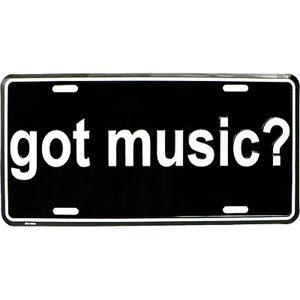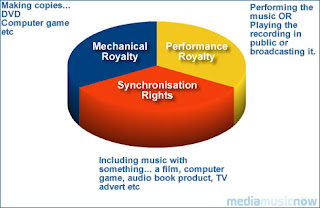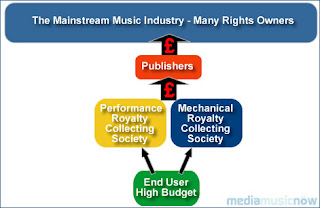 Music Licensing 101
Music Licensing 101Music licensing for film can be a daunting task and is an often overlooked final item that gives most filmmakers and producers fits. The truth of the matter is music licensing is a relatively easy task if you go about it in the right way.
First off, I’d like to dispel a few common myths about music usage. ANY music included in your film requires the prior written permission of the copyright owner. There is no such thing as an accepted minimum use or using up to 30 seconds of a track of music. ANY usage without prior approval is illegal. The only exception being recordings that are considered “Public Domain” . These will of course be on wax cylinders and 78 and early 33 RPM vinyl, so quality could be an issue here. Thus, basically ALL recordings require permission.
Another valid point that needs to be considered is the fact that for most contemporary music, there are two rights involved. The copyright for a recording is split between the owner of the sound recordings (the record label) and the owners of the underlying music (publishers). Like sound recordings, the same applies with regards to Public Domain works in publishing. In almost all cases, you can use underlying music written prior to 1923 without the consent of the publisher as it is deemed to be in the Public Domain. If it happens to be an old tune that has been arranged and re-issued, you will however need permission. The best place to get this information is to take it from the liner notes of whatever recording you are wishing to use. Most commercial recordings give publisher and writer credits and obviously, you will want to contact the record label that released the recording in question for the Master Use License (sound recording permissions). To be sure you are contacting the right entities it is best to do some additional research regarding the work…
A few great sources for this information are:
http://www.Copyright.gov - The official site of the US Copyright office
http://www.BMI.com – Performance Royalty Organization that features an easy to search listing of works
http://www.Ascap.com - Performance Royalty Organization that features an easy to search listing of works
http://www.HarryFox.com – Mechanical Royalty organization featuring a search as well
So I have figured out who to contact but how do I get permission?Once you have acquired the appropriate information, you will need to submit a request for permission to the rights-holders of the Sound Recording (record label) and Underlying Copyrights (publisher(s)). The best way to submit this is via a formal request letter and personally speaking, an email is always appreciated over it’s slower predecessor. In the letter you will want to give all pertinent details of the film project including a brief synopsis, the name, address and contact info of your production company, overall budget, rights sought ( i.e. film-festivals only [cheaper!!], film festival and tv, All Media- World-wide – Perpetual rights [most expensive], or a tiered license with “options” you can exercise at a later date for those large rights). If at all possible, propose a reasonable price that you are willing to pay for the music. This will help the licensor immensely as they deliberate your situation. Master Use licenses fluctuate greatly from “free” to multiple thousands of dollars. Typically, the licensor will have a number in mind depending on the size of the project and the usage of the music, but it is always nice to make a fair offer. In many cases, you can get good background music at one-stop music licensing houses. These include a bevy of professional companies featuring “stock” background music… another option is to go with Classical music as the majority of it is in the Public domain. On average, 8 out of 10 Master Use Licenses we issue are essentially “all-in” as there are no rights to be obtained for Mozart, or Bach’s compositions.
---------------------------------------------------------------------------------------------------
Your request should follow the guidelines below…
1. Give a summary of your project, a description of where and how exactly will the work be used (e.g. title theme, background music, the climax scene, over the closing credits, etc.) and the media rights you want (e.g. film festivals, broadcasting theaters, Website, Radio/TV commercials, audio tours, etc.)
2. If your license request is for a video production, consumer product (e.g. video games, compilation CD’s, Corporate promotional CD’s) is important that you tell us the number of units you plan to manufactured.
3. Also, to easily identify the work you are interested in, use the catalog number or any criteria relevant to the work. Here are some other very useful criteria you should us: Title(s) and duration of music, Composer, Artist/Performance group, Director.
Please don’t forget the following either (Your personal information):
Name:
Title:
Email:
Address:
Country:
Fax:
Organization:
Company/Institution:
Web Page:
…and finally;
Format of music required:
Geographical use of music:
Duration of license required:
Do you need us to send the CD/digital clips to you?
Any other relevant information:
How long should I wait before following up…?Like so many other busy professionals, Licensing agents are constantly barraged with a slew of requests each and every day. Followup time is very much dependent on circumstances that are beyond your control. A good rule of thumb is to wait at least a week before following up. I know from my own clients that certain companies are much better about following up with potential licensees than others. In order to insure that you are not left in a lurch waiting on final permissions before your mix-down, it is highly recommended that you start this process months before you will actually need the information.
Once we agree on terms, what happens next?Once terms are agreed upon, the licensor will issue an agreement to you (the licensee). The agreement will outline all of the fine details surrounding the usage including; type of usage, Term (how long), Territory ( where you may show your film), included rights, and price. After carefully reading the agreement, sign two copies and send them along with a check for the usage agreed to. Once the licensor receives the agreement, they will process the check and countersign returning a final copy to you for your files. Keep all legal documents together in a common file for your film. These are often required for entry into film festivals, and will most certainly be required in case anyone ever questions the music contained in your film.
Questions?If you have any questions regarding music licensing, or any interest in licensing music from Naxos for your upcoming project, please feel free to contact me directly. I am always eager to discuss new and upcoming projects with filmmakers and enjoy helping new producers and filmmakers through the licensing process. I personally represent the Naxos catalog which is filled with thousands of the world’s finest Classical, World, and Jazz recordings. If I can be of assistance to you… I will be my pleasure to help.
You can email me at rfoster (at) NaxosUsa (dot) com - also please check out www.NaxosLicensing.com for more information.







